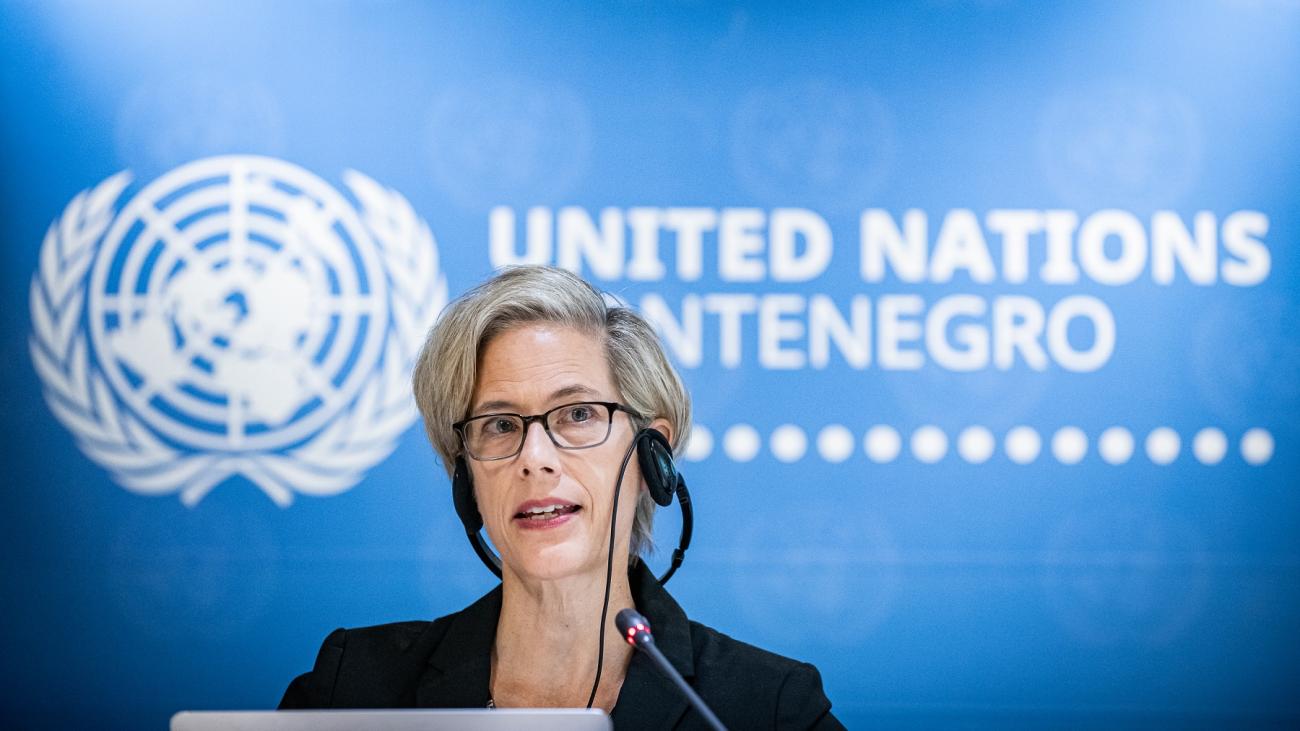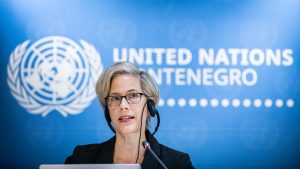A team of Kenya Red Cross Society volunteers assisting floods victims. PHOTO/Red Cross.
By PATRICK MAYOYO
As the evening descended on Kamuchiri village in Kenya’s Rift Valley, Joyce Nyokabi prepared dinner for her children, unaware that it would be the last time they gathered under the roof of their home.
For Joyce, this quiet moment of normalcy was soon to be shattered, not by a force of nature she could see, but one that would leave invisible scars long after the waters had receded.
Every morning, Joyce rose early, a routine ingrained by years of managing her family’s farm. That day was no different. In the soft glow of dawn, she had prepared breakfast for her children and set out to tend to her crops.
The sun, warm and hopeful, seemed to promise a good day ahead. But as the evening arrived, bringing with it the comforting rhythm of a family dinner, an eerie sense of unease began to settle in the air.
Without warning, that unsettling quiet was broken by the sounds of rushing water, a torrent so fierce it could not be mistaken for rain. In an instant, Joyce’s life was thrown into chaos.
The dam upstream had burst, unleashing a flood that surged through Kamuchiri and Jerusalem villages, submerging homes, washing away crops, and leaving behind devastation in its wake.
“We were woken by the sound of rushing water,” Joyce recalls, her voice filled with the same disbelief she felt that night. “It wasn’t just rain, it was a roar.”
By morning, the true magnitude of the disaster became clear: over 48 lives had been lost, entire communities had been displaced, and the futures of many families hung in the balance. But amid the physical wreckage, a far deeper and far less visible catastrophe was unfolding, one that extended far beyond the reach of water.
As the floodwaters receded, the psychological damage left in their wake became undeniable. The emotional scars of trauma, loss, and fear began to surface, intangible but all-consuming. Joyce and her neighbours had lost more than their homes; they had lost a sense of safety, stability, and hope.
Research increasingly reveals the dark side of climate change: the unseen toll it takes on mental health. Extreme weather events, floods, droughts, wildfires, cyclones, landslides, and rising sea levels, leave far more than physical destruction in their wake.
Anxiety, grief, post-traumatic stress disorder (PTSD), and deep feelings of helplessness spread like a virus, affecting not just the direct victims but entire communities.
For many, the wounds of such disasters never truly heal. The trauma lingers, festering in the minds of those who have experienced loss, displacement, and upheaval.
And as we witness more of these catastrophic events, fuelled by the changing climate, it becomes ever clearer that our response must go beyond the rebuilding of infrastructure. We must rebuild the mental resilience of our communities.

Mr Alfred Weku (right), a practicing psychologist in Kenya, during a past counseling event. PHOTO/UGC.
The effects of climate change, though often measured in terms of carbon emissions and temperature rises, are not just environmental, they are deeply human. As we race towards the 2030 deadline for achieving the Sustainable Development Goals (SDGs), we must acknowledge that the true cost of climate change is not just the destruction of the planet, but the irreversible damage to our collective psyche.
When we speak of climate change, let us not forget that the wounds are both physical and psychological. And the healing, like the rebuilding of homes, is long and difficult—requiring not only global action but deep empathy for the mental health of those most affected.
Today, majority of the victims of the recent disasters in the country are yet to receive any counselling amid revelations that Kenya is facing an acute shortage of mental health specialists that include counseling psychologists and psychiatrists.
According to, Mr Alfred Weku, a practicing psychologist in Kenya, climate change is an escalating global crisis with profound implications not only for our environment but also for human health, including mental health.
“The link between climate change and mental health is multi-faceted, involving both direct and indirect effects,” he says.
Mr Weku says natural disasters such as hurricanes, floods, and wildfires which are increasing in frequency and severity due to climate change cause immediate psychological trauma, leading to conditions such as acute stress disorder and post-traumatic stress disorder (PTSD).
“The anxiety and fear related to the future of the planet can lead to eco-anxiety, a chronic fear of environmental doom,” he notes.
Mr Weku says addressing the mental health impacts of climate change requires comprehensive strategies that integrate mental health support into climate action plans emphasizing that the government and non-governmental organisations (NGOs) should integrate mental health considerations into climate policies and emergency response plans.
“This holistic approach ensures that mental health is not neglected in the face of climate challenges. The second strategy is raising awareness about the mental health impacts of climate change and educating the public on coping strategies that can reduce stigma and encourage individuals to seek help,” he adds.
Mr Weku adds promoting community programs that promote social cohesion and resilience can help individuals cope with the stress of climate-related events by creating support networks and providing mental health resources.
Extreme weather events like record-breaking temperatures, storms, floods, drought, wildfires, rising sea levels, melting glaciers, ocean acidification and desertification are not only causing mental health complications but also driving forced migration hunger and other health complications.
According to, Dr David Kabera Muthondeki, a counselling psychologist with the Kenya Police Service, the increasingly violent forces of nature; floods, droughts, mudslides, wildfires, heatwaves, cyclones, and rising sea levels, are not only reshaping our planet but also irreparably altering the lives of countless individuals.
These extreme events devastate communities, destroy homes, strip away livelihoods, and often leave behind an indelible sense of loss.

INFOGRAPHIC/Kenya Red Cross.
The toll, however, runs far deeper than physical destruction. Dr Muthondeki reveals that the emotional scars left by such catastrophes are profound, with many victims falling into despair, battling anxiety, and struggling with overwhelming feelings of hopelessness.
“These events can freeze communities in time, trapping people in a cycle of trauma,” he explains, his words heavy with the weight of experience.
In the face of such devastation, many individuals lack the mental resilience to process their suffering, leading to widespread cases of Post-Traumatic Stress Disorder (PTSD).
But it doesn’t end there. Dr Muthondeki highlights a critical gap in recovery efforts: the absence of proper trauma debriefing for survivors. Without the support needed to navigate their emotional pain, many are left without a lifeline, their mental wellbeing further eroded by a sense of isolation and hopelessness.
As the climate crisis accelerates, so too does the invisible toll on the human psyche, one that demands urgent attention before the scars of this new era become too deep to heal.
Christie Manning, an environmental psychologist at Macalester College in Saint Paul, Minn and a coauthor of the “Mental Health and Our Changing Climate” report published by the American Psychological Association, Climate for Health, and EcoAmerica says beyond the physical maladies brought on or exacerbated by climate change, there’s the potential for a host of mental health issues.
When it comes to evaluating how our mental functioning is affected by climate change, Manning and other mental health experts have tended to find consistent patterns.
“It’s pretty standard these days to think about the mental health impacts in three broad categories,” Manning said as reported by EoS.
Climate change is one of the 17 United Nations Sustainable Development Goals popularly known as 2030 Agenda, whose aim is to eradicate poverty in all its forms and dimensions, including extreme poverty which is the greatest global challenge and an indispensable requirement for sustainable development.
The Sustainable Development Goal (SDG) number 13 together with other goals and 169 targets demonstrate the scale and ambition of the universal Agenda.
Goal number 13 on climate change is the primary international, intergovernmental forum for negotiating the global response to climate change. The goal calls for urgent action to combat climate change and its impacts.
Scientists and policymakers have set a goal of limiting global warming to 1.5°C above pre-industrial levels. Today, the planet is only 0.4°C from that mark.

The 17 UN goals that aim to transform the world. INFROGRAPHIC/UN.
The UN Sustainable Development Goals Report 2023 provides a powerful call to action, as it not only highlights the existing gaps and urges the world to redouble its efforts, but also emphasizes the immense potential for success through strong political will and the utilization of available technologies, resources and knowledge.
According to the report, the impacts of the climate change like floods, droughts, landslides and mudslides, cyclones and wildfire among others, the war in Ukraine, a weak global economy, and the lingering effects of the COVID-19 pandemic have revealed weaknesses and hindered progress towards the implementation of the Goals.
The report further warns that while lack of progress is universal, it is the world’s poorest and most vulnerable who are experiencing the worst effects of these unprecedented global challenges. It also points out areas that need urgent action to rescue the SDGs and deliver meaningful progress for people and the planet by 2030.
The SDGs or the 2030 Agenda for sustainable development development is a plan of action for people, planet and prosperity. It also seeks to strengthen universal peace in larger freedom.
As the world speeds toward the 2030 deadline for achieving the United Nations Development Goals (SDGs), one critical issue looms on the horizon; an issue far more profound than the melting glaciers or rising sea levels we often hear about.
It is the invisible, yet profound toll climate change is exacting on our mental health, a cost that, if left unchecked, will leave an indelible mark on our collective psyche for generations to come.
When we talk about climate change, we usually think of the earth’s physical scars, the flooded villages, the scorched forests, the desolate landscapes left in the wake of wildfires.
We think about the oceans creeping ever closer to our shores, the once-thriving ecosystems crumbling under rising temperatures. But what if the greatest casualty of climate change is not just the planet itself, but the fragile mental fabric of the people who inhabit it?
A growing body of research, including from organisations like the World Health Organization (WHO) and American Psychological Association (APA) among bodies, highlights a troubling reality: the true cost of climate change is not just in the destruction of infrastructure, but in the psychological damage it causes.
As floods sweep through communities, as wildfires consume entire towns, and as droughts destroy livelihoods, the mental health of individuals is pushed to the breaking point. This is an urgent issue, one that threatens not only our global progress on the SDGs but also the stability of our societies.
In many ways, the physical effects of climate change are obvious. Hurricanes, cyclones, and floods are powerful visual reminders of how the planet is changing.
Yet, it is the unseen, more insidious damage, mental illness; that often goes unaddressed. Studies have shown that extreme weather events, such as floods, droughts, and wildfires—are directly linked to rising rates of anxiety, depression, and Post-Traumatic Stress Disorder (PTSD), particularly in communities that have experienced repeated disasters.
The mental health burden is not only felt immediately after an event, but can linger for years, often worsening as people are forced to contend with a future filled with uncertainty.

Children are more vulnerable to many of the effects of climate change due to their small size, developing organs and nervous systems, and rapid metabolisms. PHOTO/APA.
The National Institute of Mental Health (NIMH) reports that the emotional toll of natural disasters can be far-reaching, with survivors experiencing a range of psychological issues, from acute stress to chronic hpost-traumatic stress disorder (PTSD).
The trauma, the loss of homes, lives, and livelihoods, and the disorienting feeling of having one’s entire world upended, can trigger deep psychological wounds that take years, sometimes decades, to heal. And yet, for many, the necessary mental health support is either unavailable or inadequate.
The SDGs, adopted by all United Nations Member States in 2015, are an ambitious call to action, designed to promote peace, prosperity, and well-being for people and the planet.
However, as we approach the 2030 deadline, the effects of climate change are beginning to undermine the very goals they seek to achieve. Climate-related disasters are not just environmental crises—they are deeply social, economic, and psychological crises that threaten to derail progress on the SDGs.
Take, for instance, SDG 1: No Poverty. Natural disasters, particularly those exacerbated by climate change, are pushing millions of people into poverty. In regions like Sub-Saharan Africa and Southeast Asia, floods, droughts, and other climate-related disasters destroy homes, crops, and businesses, displacing people and plunging them into economic instability.
The aftermath is not just financial; it is emotional. When families lose their homes, they also lose their sense of security, their confidence in the future, and their mental well-being. Without the resilience to face such challenges, many find themselves caught in an unending cycle of despair.
Similarly, SDG 3: Good Health and Well-being is under direct threat from climate change. As the physical health effects of climate-related disasters escalate, so too do the mental health challenges. The emotional trauma of displacement, the loss of loved ones, and the sense of helplessness that comes with witnessing one’s community crumble can have long-lasting effects on psychological well-being.
According to the World Health organization (WHO), the mental health implications of climate change are becoming so severe that they are now considered a “silent epidemic,” one that is vastly underestimated in current climate policies.
Perhaps one of the most pressing issues to emerge from the intersection of climate change and mental health is the rise of Post-Traumatic Stress Disorder (PTSD).
Survivors of natural disasters are increasingly reporting symptoms of PTSD, which include flashbacks, severe anxiety, and feelings of helplessness. These individuals often feel disconnected from their communities, unable to rebuild their lives because the trauma is so overwhelming.
A report from the American Psychological Association (APA) stresses that PTSD in the context of climate change is not just an isolated issue for a few individuals, it is becoming a public health crisis.
People who experience repeated or severe environmental trauma, such as prolonged droughts or recurrent floods, face a higher likelihood of developing PTSD.
This chronic trauma, compounded by the ongoing threat of climate-related disasters, leads to mental health issues that can span generations. As a result, whole communities are left with psychological scars that hinder their ability to rebuild and recover.

A doctor at work. PHOTO/UGC.
The mental health impacts of climate change are not just an individual issue, they are a collective one. As the climate crisis worsens, the psychological toll on communities will only deepen, affecting social cohesion and stability. It is not enough to rebuild homes and infrastructure; we must also address the mental health crises that accompany such destruction.
Governments, NGOs, and international bodies must prioritise mental health in their climate action plans. This means providing immediate psychological support to survivors, integrating mental health services into disaster response strategies, and promoting mental resilience through education and community engagement.
Only by acknowledging the profound psychological impact of climate change can we hope to achieve the SDGs and ensure that we are building not only a sustainable planet but also a mentally resilient one.
The reality is stark: if we continue to ignore the mental health consequences of climate change, we risk compromising the future of the SDGs themselves. The true cost of climate change is not just the destruction of ecosystems or the loss of biodiversity.
It is the irreversible damage to our collective psyche, the lasting impact on the minds of individuals and communities that is harder to heal than any physical scar.
As we race toward 2030, it is imperative that we recognise this silent epidemic and take action; not just to protect our planet but to protect the mental well-being of those who call it home. For only by addressing both the environmental and psychological crises together can we hope to build a future that is truly sustainable.
United Nations Secretary-General António Guterres, has called on the world’s governments, news media and tech companies to ban advertising from fossil fuel companies in light of the industry’s continued greenwashing of its role in perpetuating the climate change.
“The truth is … almost 10 years since the Paris Agreement was adopted, the target of limiting long-term global warming to 1.5 degrees Celsius is hanging by a thread. The truth is … the world is spewing emissions so fast that by 2030, a far higher temperature rise would be all but guaranteed,” Guterres noted.
The Paris Agreement‘s central aim is to strengthen the global response to the threat of climate change by keeping a global temperature rise this century well below 2 degrees Celsius above pre-industrial levels and to pursue efforts to limit the temperature increase even further to 1.5 degrees Celsius.
Another study by, American Psychological Association (APS), says when people learn about and experience local climate impacts, their understanding of the effects of climate change increases.
Dr Arthur C. Evans Jr, APA’s chief executive officer, say the health, economic, political and environmental implications of climate change are affecting everybody and the tolls on our mental health are far reaching.
“As climate change is created largely by human behavior, psychologists are continuing to study ways in which we can encourage people to make behavioral changes — both large and small — so that collectively we can help our planet,” Dr Evans Jr adds.

United Nations Secretary-General António Guterres. PHOTO/UN.
A study by The Commonwealth Fund notes that the physical health impacts of climate change are everywhere as extreme temperatures lead to heat stroke and death, floods cause displacements and spread waterborne disease, and air pollution from wildfires leads to respiratory and cardiovascular illness.
The research says evidence is emerging that climate change can also affect our mental health, putting further pressure on a behavioral health services sector already in crisis.
It adds that living through an extreme weather event such as a hurricane, wildfire, flood, or drought can be traumatizing observing that 67 percent of individuals with direct exposure to the California Camp Fire of 2018 said they experienced trauma similar to PTSD, compared with 14 percent of those indirectly exposed.
“These effects can last for years, as reported by those who lived through Hurricane Katrina,” the study notes.
Another study, Ecological Grief as a Mental Health Response to Climate Change-related loss notes that climate change is increasingly understood to impact mental health through multiple pathways of risk, including intense feelings of grief as people suffer climate-related losses to valued species, ecosystems and landscapes.
The report observes that despite growing research interest, ecologically driven grief, or ‘ecological grief’, remains an underdeveloped area of inquiry and the scientists argue that grief is a natural and legitimate response to ecological loss, and one that may become more common as climate impacts worsen.
Another research, Mental Health and Our Changing Climate, says the impacts of climate change on people’s physical, mental, and community health arise directly and indirectly adding some human health effects stem directly from natural disasters exacerbated by climate change, like floods, storms, wildfires, and heatwaves.
It says other effects surface more gradually from changing temperatures and rising sea levels that cause forced migration. Weakened infrastructure and less secure food systems are examples of indirect climate impacts on society’s physical and mental health.
The study outlines how climate solutions and lifestyle choices can curtail the mental health impacts incurred when economies, physical and social infrastructures, and social identities are eroded by climate change.
The Commonwealth Fund research also reveals that climate change is also having an impact on the mental health of people who haven’t personally experienced climate-related disasters as more than two-thirds of U.S. adults (68%) have reported having at least some anxiety about climate change.
The study observes that as climate change continues to drive more extreme temperatures and worsening air pollution, the impact on mental health will likely continue to grow.
“Rising ambient temperatures have already been found to increase rates of mental health–related emergency department visits. Violent incidents and suicide attempts also climb as temperatures rise. Similarly, long-term exposure to air pollution has been associated with elevated anxiety levels and even an increase in suicides,” it emphasises.

A medic taking the blood pressure of a patient. PHOTO/WHO.
It also reveals that climate change also can raise stress and anxiety levels for people robbed of their economic livelihoods — as when farmers can no longer grow their crops because shifting weather patterns have led to frequent drought or flooding.
“Extreme weather events can also destroy businesses, severely hamper economic activity, and lead to both short- and long-term financial challenges.” the report concludes.
The study proposes a number of solutions on reducing the impact climate change is having on peoples mental health and this includes improving mental health services and working to tackle climate change.
The solutions includes; support for those at risk, investment in treatment models and support, support for action to address climate change, provider awareness and education and conduct further research and evaluation.
It has to be noted that even those untouched by disaster feel he weight of climate anxiety bearing down upon them. As temperatures soar and air quality plummet, a pervasive sense of unease grip the populace.
The looming specter of environmental catastrophe cast a pall over the collective psyche, exacerbating an already strained mental health system.
As the world grapples with the realities of climate change, resilience has emerged as a guiding principle—a beacon of light in the darkness. For Nyokabi and countless others like her, the road ahead is fraught with challenges.
But as they rebuilt their lives from the rubble of disaster, they have found strength in solidarity, hope in resilience, and courage in the face of uncertainty.


















